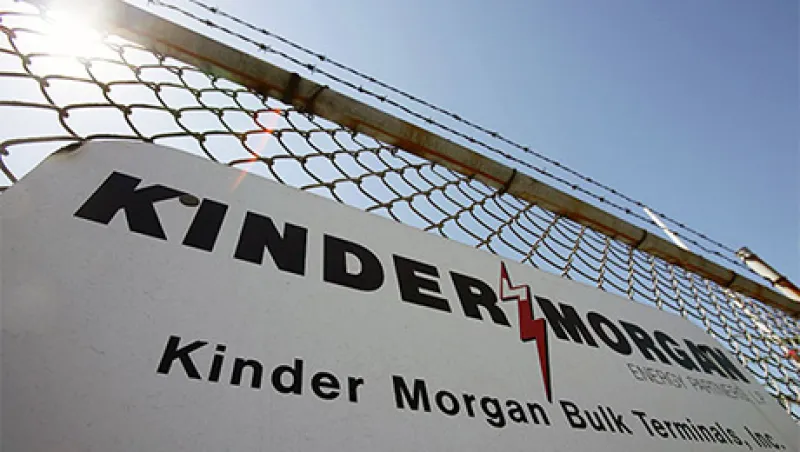Richard Kinder, chief executive of Kinder Morgan, is the master of the master limited partnership. Starting in 1997 with the purchase of Enron Liquids Pipeline, a small division cast off by then-high-flying Enron Corp., he used the MLP to build Houston-based Kinder Morgan into a giant with 80,000 miles of gas and oil pipelines sprawling across North America.
But in business nothing lasts forever. In August, Kinder stunned the market with a plan for the creative destruction of his three main MLPs — Kinder Morgan Energy Partners, Kinder Morgan Management and El Paso Pipeline Partners — folding them into their conventional corporate parent, Kinder Morgan, at a cost of $49.6 billion in cash and stock plus $26.6 billion in assumed debt.
Driving Kinder’s change of heart was his empire’s cost of capital, says Michael Jamieson, Houston-based co-head of North American energy banking at Citigroup, one of two investment banks that Kinder Morgan hired for the transaction. A great advantage of the MLP is that it distributes earnings to unit holders rather than retaining profits, thus avoiding federal corporate taxes. As Kinder was the first to discover, cash-flow-rich underlying assets like pipelines can produce handsome returns under this structure at relatively low risk.
The weakness of an MLP is that as it grows, so do the so-called incentive distribution rights, or the share of the payout taken by the managing partner. These IDRs usually start at 2 percent, but at the Kinder Morgan MLPs they had mushroomed to nearly 50 percent, straining the funds’ earning capacity and making it expensive for them to borrow. “For every penny you pay out to the partners, you’re also paying a penny to yourself, which makes it hard to grow once you become a $40 billion company,” Jamieson says.
CEO Kinder underlined a related rationale, speaking to the Wall Street Journal after the deal was unveiled: The U.S. shale energy boom has spawned a new generation of smaller competitors, and a conventional C-corporation share makes a more potent acquisition currency. The 70-year-old tycoon, who helped found Enron before striking out on his own in 1996, said he looks forward to a “fertile field to do a little grazing in.” He declined to be more specific, though analysts have speculated that Kinder Morgan may be interested in adding upstream assets in oil and gas production.
For Citi and co-adviser Barclays, getting to yes wasn’t a problem with Kinder effectively controlling both Kinder Morgan and the MLPs; the two banks shared $18 million in fees, versus a combined $12.5 million for sell-side advisers Jefferies and Tudor, Pickering, Holt & Co. But some of the technicalities were thorny, especially the transfer of depreciation credits and other tax benefits from the MLPs to the acquiring parent corporation. Niggling details in this area can translate to large sums: Kinder Morgan expects to reap $20 billion in tax advantages over the next 14 years.
Outside MLP investors end up on the wrong side of the tax equation. Uncle Sam’s share of MLP distributions is deferred up to the amount of the original investment, but the cash or stock they receive for the buyout will suddenly become taxable income. Investors seem satisfied, however, that the consolidation will create enough value to offset this blow. Kinder Morgan shares climbed 15 percent between the August 10 deal announcement and December 2, compared with 8 percent for the S&P 500 index and a 7 percent decline in an S&P index of U.S. energy stocks.
Kinder’s $76.2 billion reversal led to much speculation that the master limited partnership is an endangered financial species. But copycat deals have yet to materialize among the 120 or so other energy MLPs, which have a combined market value of $875 billion, according to Bloomberg. “The MLP market is still very viable and robust,” Citi’s Jamieson says.
Top 10 Deals of 2014
- Kinder Morgan Goes All In
- Comcast Faces Screen Test
- Actavis Realizes Bigger Pharma Ambitions
- Medtronic, Covidien Home In on Tie Up
- Lafarge and Holcim Pour It On
- Alibaba Sets IPO Record with NYSE Debut
- Facebook's Data-Driven Takeover of WhatsApp
- Altice Turns Paper Profit
- Eurobank Ergasias Spearheads a Greek Banking Revival
- Bond Issue Boosts U.K.'s Renminbi Trading Cred






